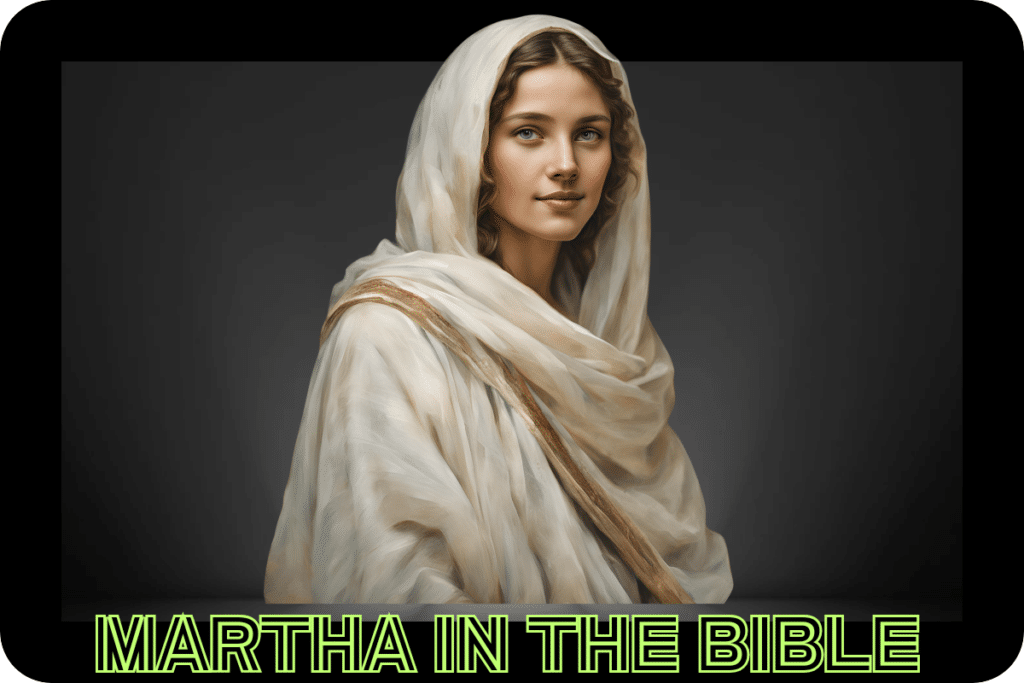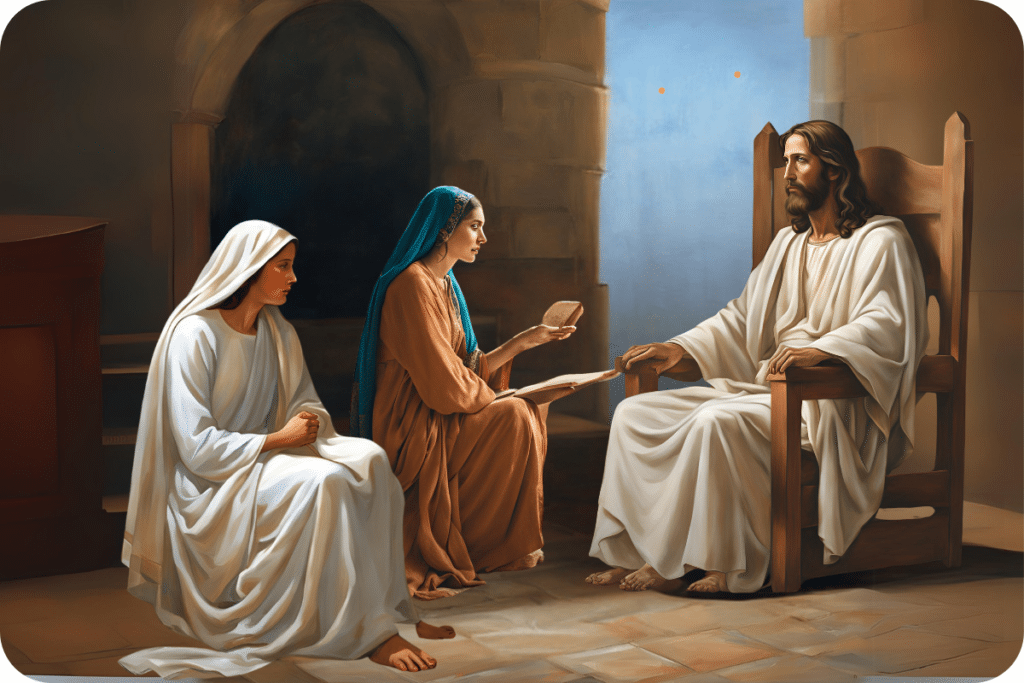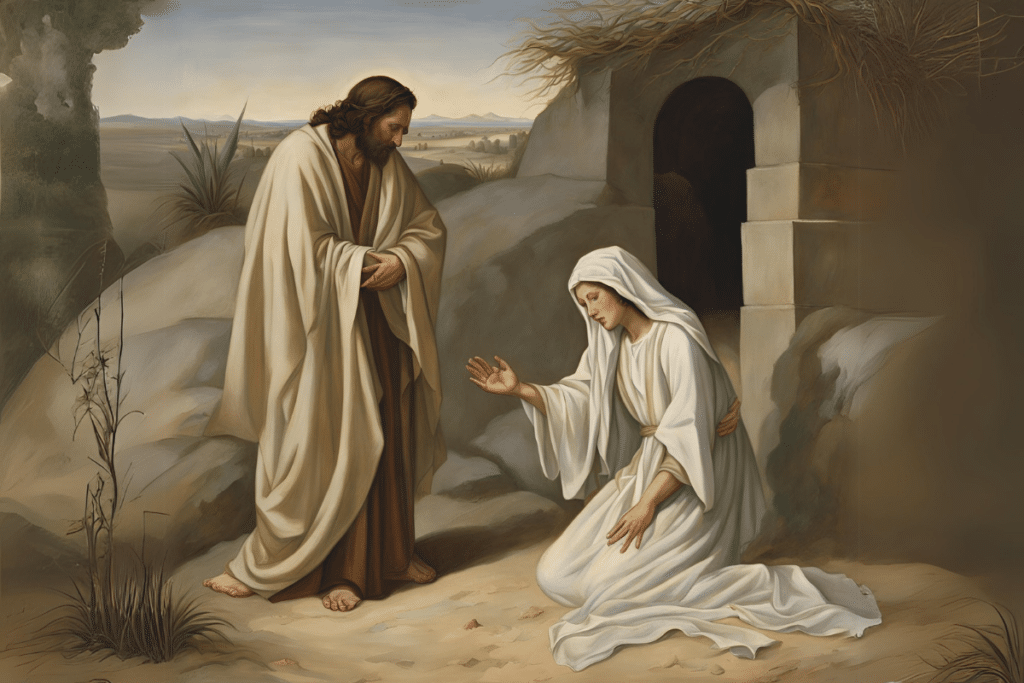MAGNANIMOUS MARTHA IN THE BIBLE
Martha, sister of Mary and Lazarus, is a significant New Testament figure known for her hospitality and faith. In Luke 10:38-42, she welcomes Jesus into her home but becomes anxious about serving, prompting Jesus to remind her of the importance of spiritual focus over busyness.

In John 11:1-44, Martha demonstrates profound faith by acknowledging Jesus as the Messiah, even after her brother’s death. Her story emphasizes the balance between active service and spiritual contemplation, illustrating that both roles are vital in the Christian faith.
Family Background of Martha in the Bible
Martha, Mary, and Lazarus lived in Bethany, a village near Jerusalem, known for its hospitality and close ties to Jesus. Their home served as a refuge for Him, where He often visited during His ministry. The siblings shared a deep bond with Jesus, evident in their interactions, such as Martha’s active service and Mary’s contemplative devotion.

Notably, Martha expressed her faith in Jesus as the Messiah during Lazarus’s resurrection, highlighting the family’s significant role in the Gospel narratives and their importance in illustrating themes of faith and friendship with Christ.
Martha’s First Mention in the Bible
Martha first appears in the Gospel of Luke, where she welcomes Jesus into her home in Bethany. While she busily prepares for His visit, her sister Mary sits at Jesus’ feet, absorbing His teachings. Frustrated, Martha asks Jesus to tell Mary to help her, prompting a gentle rebuke from Jesus.

He emphasizes that Mary has chosen the better path by prioritizing spiritual nourishment over worldly tasks. This narrative illustrates Martha’s character as devoted yet distracted, highlighting the tension between active service and spiritual reflection. Ultimately, it sets the stage for understanding her growth in faith and devotion to Jesus.
Personality Traits of Martha in the Bible
Martha is characterized as a proactive woman, known for her hospitality and dedication to serving Jesus and His disciples. Her eagerness to care for others often leads to anxiety, particularly evident when she asks Jesus to tell her sister Mary to help her. Jesus gently rebukes Martha, emphasizing the importance of spiritual nourishment over worldly tasks.
This interaction highlights the common struggle among believers to balance daily responsibilities with spiritual commitments. Martha’s story serves as a reminder that while service is vital, it should not overshadow the need for personal connection and reflection in one’s faith journey.
The Story of Lazarus’s Resurrection
One of the most powerful narratives involving Martha is the resurrection of her brother Lazarus, found in John 11. When Lazarus falls ill, Martha and Mary send for Jesus, but He arrives after Lazarus has died. Despite her profound grief, Martha expresses unwavering faith, stating, “Lord, if you had been here, my brother would not have died. But even now, I know that whatever you ask from God, God will give you” (John 11:21-22).

This moment is pivotal as Jesus reveals His identity, declaring, “I am the resurrection and the life,” and challenges Martha to believe in Him. Her response, affirming Jesus as the Messiah, showcases her deep faith. Ultimately, this encounter leads to the miraculous raising of Lazarus, further solidifying Martha’s trust in Jesus and illustrating the theme of faith triumphing over despair.
Martha’s Dialogue with Jesus
Martha’s dialogue with Jesus during Lazarus’s resurrection reveals her profound faith. When Jesus says her brother will rise again, Martha assumes He means at the end of time. However, Jesus declares, “I am the resurrection and the life,” challenging Martha to believe in Him as the source of eternal life.
Without hesitation, Martha confesses her belief that Jesus is “the Christ, the Son of God.” This pivotal moment showcases Martha’s deep spiritual understanding and unwavering faith in Jesus as the Messiah. Her confession ranks alongside Peter’s and serves as a cornerstone of Christian belief in Jesus as the giver of life and the path to eternal salvation.
Martha and Mary: A Comparative Analysis
The contrast between Martha and Mary offers valuable lessons for Christians. Martha embodies practical service and action, focusing on hospitality and care for others, while Mary represents contemplation and spiritual devotion, prioritizing listening to Jesus. Their differing approaches highlight the necessity of both aspects in a balanced Christian life.
Martha’s commitment to service does not diminish her faith; instead, it complements Mary’s contemplative nature. This dynamic illustrates that service and spirituality can coexist harmoniously, encouraging believers to integrate both action and reflection in their faith journeys, fostering a more holistic relationship with God and others.
Martha’s Later Life and Legacy
The Bible provides limited information about Martha’s life after Lazarus’s resurrection. However, various traditions suggest she continued her life of service and faith, possibly traveling to spread Jesus’ teachings. Some accounts place her in regions such as France or other parts of the world, where she is believed to have evangelized.
Martha’s legacy as a devoted servant of Christ endures in Christian tradition, symbolizing the importance of faith and action. Her story inspires believers to embrace both service and spiritual devotion, reflecting the dual aspects of a faithful Christian life.
Martha in Christian Theology
Martha symbolizes active service in Christian theology, highlighting the importance of serving others as a key aspect of faith. Her role in the Bible, particularly in Luke 10:38-42, emphasizes the need for balance between work and worship. While Mary represents contemplation, Martha’s dedication to hospitality and service illustrates that both action and spiritual devotion are essential for a fulfilling Christian life.
Church teachings often reference Martha’s story to encourage believers to integrate their daily responsibilities with their spiritual commitments, reinforcing that true service should stem from a heart centered in faith and devotion to God.
Martha’s Influence on Christian Women
Martha serves as a powerful role model for Christian women, exemplifying the virtues of service and hospitality. Her dedication to her responsibilities, particularly in caring for Jesus and His disciples, highlights the importance of active faith in daily life. Despite her initial anxiety, Martha grows in her understanding of Jesus, ultimately expressing profound faith in Him as the Messiah.
Her example encourages modern Christians to embrace both service and spirituality, demonstrating that fulfilling one’s duties can coexist with deep faith. Martha’s legacy inspires women today to z action and devotion in their spiritual journeys.
Martha in Art and Culture
Martha has been a subject of artistic and literary depictions that explore her role as a dedicated servant. In paintings, she is often shown serving Jesus, symbolizing her practical nature and hospitality. Literary works, such as Karel Čapek’s “Apocryphal Tales” and Rudyard Kipling’s poem “The Sons of Martha,” delve into her character.
Even in modern fiction like Margaret Atwood’s “The Handmaid’s Tale,” the term “Martha” is used to refer to infertile women forced into servitude. These representations keep Martha’s story alive in the cultural imagination, highlighting her significance as a figure who embodies the balance between active service and spiritual devotion.
Misconceptions About Martha
Martha is often misunderstood as less spiritually inclined than her sister Mary, but this perspective oversimplifies her character. While Martha is focused on service, her profound faith and understanding of Jesus’ teachings are evident, particularly during the resurrection of Lazarus. She boldly declares her belief in Jesus as the Messiah, showcasing her deep spiritual insight.
Martha’s dedication to hospitality and her willingness to express her concerns to Jesus reflect a strong relationship with Him. Clarifying these misconceptions allows for a fuller appreciation of Martha’s role, emphasizing that both service and spirituality are essential components of a vibrant faith.
Martha’s Feast Day and Celebrations
The Roman Catholic Church and some other Christian denominations celebrate the feast day of Saint Martha on July 29th, honoring her significant contributions to the Christian faith. The day is marked by readings from the Bible, particularly the Gospel accounts of Martha’s interactions with Jesus, such as her hospitality in welcoming Him into her home and her profound declaration of faith during the raising of her brother Lazarus.
Prayers and reflections focus on Martha’s example of active service and devotion, encouraging believers to balance their spiritual lives with practical acts of love and care for others. Her feast day serves as a reminder of the importance of faith in action and the power of unwavering belief in Jesus.
Martha’s Relevance Today
The story of Martha in the Bible remains relevant today as it addresses the balance between work and spiritual life. In a world filled with overwhelming responsibilities, her example serves as a reminder of the importance of maintaining faith and devotion amidst daily tasks. Martha’s experience illustrates that while active service is essential, it should not overshadow spiritual growth.
Her interactions with Jesus encourage Christians to integrate their duties with their spiritual aspirations, fostering a harmonious relationship between action and contemplation. Ultimately, Martha’s legacy inspires believers to seek balance, ensuring that both service and spirituality enrich their lives.
Lessons from Martha in the Bible
Martha, the sister of Mary and Lazarus, offers several valuable lessons through her life and interactions with Jesus in the Bible. Here are some key lessons we can learn from Martha’s life:
1. The Importance of Balancing Service and Worship
- Martha is known for her dedication to serving others, but her story also highlights the need to balance service with worship. In Luke 10:38-42, when Martha is busy with preparations and asks Jesus to tell Mary to help her, Jesus gently reminds her that Mary has chosen the “better part” by sitting at His feet and listening to His teachings. This teaches us that while service is important, it should not overshadow our time spent in spiritual reflection and communion with God.
2. Faith in Times of Crisis
- In John 11, when Lazarus dies, Martha shows remarkable faith by expressing her belief that Jesus could have prevented her brother’s death and that even now, God will give Him whatever He asks. Her faith is rewarded when Jesus raises Lazarus from the dead. This teaches us the importance of maintaining faith in God’s power, even in the midst of personal crises and challenges.
3. The Value of Hospitality
- Martha’s eagerness to welcome Jesus into her home and provide for Him and His disciples demonstrates the value of hospitality. Being hospitable and caring for others is a key aspect of Christian life, and Martha exemplifies this through her actions.
4. Honesty in Our Relationship with God
- Martha’s interactions with Jesus are marked by honesty and openness. She does not hesitate to express her frustrations or concerns, as seen when she asks Jesus to intervene when Mary is not helping her with the household tasks. This teaches us that we can be honest with God about our feelings, and that open communication is a vital part of a strong relationship with Him.
5. Learning to Prioritize Spiritual Needs
- One of the lessons from Martha’s life is the need to prioritize spiritual needs over worldly concerns. While Martha was focused on her duties, Jesus gently pointed out that spiritual nourishment is essential. This reminds us to ensure that our spiritual health is not neglected amidst the busyness of life.
6. Recognizing Jesus as the Source of Life
- Martha’s declaration of faith in John 11:27, where she acknowledges Jesus as the Messiah and the Son of God, is a powerful testament to her belief in Him as the source of eternal life. This teaches us the importance of recognizing and affirming our faith in Jesus as the foundation of our lives.
7. Embracing Our Unique Roles
- Martha and Mary represent different but equally important aspects of Christian life—service and contemplation. Martha’s story teaches us to embrace our unique roles and strengths, understanding that both action and reflection are valuable in our spiritual journey.
8. Finding Peace in Letting Go of Anxiety
- Martha’s anxiety over her responsibilities is gently addressed by Jesus, who invites her to find peace in focusing on what truly matters. This lesson encourages us to let go of our anxieties and trust in God’s provision, finding peace in His presence.
9. Serving with Love, Not Out of Obligation
- While Martha was diligent in her service, the lesson from her life is that our service should be motivated by love rather than mere obligation. Serving others is most meaningful when it is done out of love for God and for those we serve.
10. Trusting in God’s Timing
- Martha’s experience with Lazarus teaches us about trusting in God’s timing. Even though Jesus did not arrive in time to prevent Lazarus’s death, His timing was perfect for demonstrating His power and glory through the resurrection. This reminds us that God’s timing, though often different from our own, is always perfect.
Martha’s life provides a rich source of wisdom, teaching us about the importance of faith, the need for balance between work and worship, and the value of honest communication with God. Her example encourages us to serve with love, trust in God’s timing, and prioritize our spiritual growth.
Characteristics of Martha in the Bible

Martha, the sister of Mary and Lazarus, her characteristics are revealed through various interactions with Jesus. Here are some key characteristics of Martha:
1. Hospitality
- Martha is known for her hospitality, particularly in the story where she welcomes Jesus into her home (Luke 10:38-42). She is eager to serve and care for her guests, showing a strong sense of responsibility and generosity.
2. Diligence and Hardworking Nature
- Martha is portrayed as a diligent and hardworking woman, who takes her duties seriously. She is often busy with preparations and ensuring that everything is in order, reflecting her commitment to serving others.
3. Practicality
- Martha’s practicality is evident in her approach to life and faith. She is focused on tangible actions and responsibilities, which sometimes causes her to become anxious or frustrated when things don’t go as planned, as seen when she asks Jesus to tell Mary to help her with the tasks.
4. Strong Sense of Duty
- Martha’s sense of duty is strong, and she is determined to fulfill her responsibilities. This sense of duty can sometimes overshadow her spiritual needs, as she prioritizes work over spending time with Jesus, as shown in the story where Mary sits at Jesus’ feet while Martha is busy with preparations.
5. Faith and Belief in Jesus
- Despite her focus on practical matters, Martha displays deep faith in Jesus, particularly in the story of Lazarus’s resurrection (John 11:20-27). She expresses her belief that Jesus is the Messiah and that He has the power to raise her brother from the dead.
6. Concern and Care for Others
- Martha’s actions demonstrate her deep concern and care for her family and others. She takes on the role of caretaker, ensuring that her loved ones are well-provided for, and she goes to great lengths to make Jesus and His disciples feel welcome in her home.
7. Honesty and Directness
- Martha is direct and honest in her interactions with Jesus. She does not hesitate to express her concerns or frustrations, as seen when she speaks to Jesus about her sister Mary not helping her. This openness reflects her close relationship with Jesus.
8. Emotional Strength
- Martha shows emotional strength in difficult situations, particularly during the death of her brother Lazarus. While grieving, she still manages to approach Jesus with faith and hope, believing in His power to perform miracles.
9. Leadership
- Martha’s leadership qualities are evident in her role within her household. She takes charge of the situation, whether it’s managing the household tasks or approaching Jesus with her concerns.
10. Balance Between Action and Reflection
- While Martha is often seen as the more active and practical sister, her interactions with Jesus reveal a growing awareness of the need to balance action with spiritual reflection. Her story encourages believers to find a balance between work and worship.
Martha’s characteristics make her a relatable and complex figure in the Bible, offering valuable lessons in faith, service, and the importance of balancing practical responsibilities with spiritual devotion.
Conclusion
Martha, sister of Mary and Lazarus, is offering timeless lessons on service, faith, and devotion. Her hospitality and dedication to caring for Jesus and His disciples exemplify the virtue of active service. Martha’s unwavering faith during Lazarus’s resurrection, where she declares Jesus as the Messiah, showcases the depth of her spiritual understanding.
Her practical approach to life, though sometimes leading to anxiety, illustrates the balance between action and contemplation. Martha’s story encourages believers to embrace both service and faith, integrating their spiritual lives with practical acts of love. Her legacy continues to inspire Christians to find harmony between their duties and their devotion to God.
Reference
Luke 10:38-42; John 11:1-44; John 12:2
Unique FAQ’s
1. What Can We Learn from Martha’s Interaction with Jesus?
Martha’s interaction with Jesus teaches us about the importance of balancing service with spiritual devotion. Her story reminds us that while service is valuable, it should not overshadow our relationship with God.
2. How is Martha Different from Mary?
Martha is often seen as the more practical and active sister, focused on serving others, while Mary is portrayed as more contemplative and spiritually focused. Both approaches are important in the Christian faith, offering a balanced view of service and worship.
3. What is the Significance of Martha’s Faith?
Martha’s faith is significant because it demonstrates a deep trust in Jesus, even in the face of loss and grief. Her confession of Jesus as the Messiah is a powerful testament to her belief in Him.
4. Why is Martha Considered a Saint?
Martha is considered a saint because of her exemplary life of service and faith. Her role in the story of Lazarus and her unwavering devotion to Jesus have made her a model of Christian virtue.
5. How Can We Apply Martha’s Example in Our Lives Today?
We can apply Martha’s example by embracing both service and faith in our daily lives. Her story encourages us to find a balance between our responsibilities and our spiritual growth, reminding us to keep our focus on what truly matters.


1 thought on “4. MAGNANIMOUS MARTHA IN THE BIBLE”